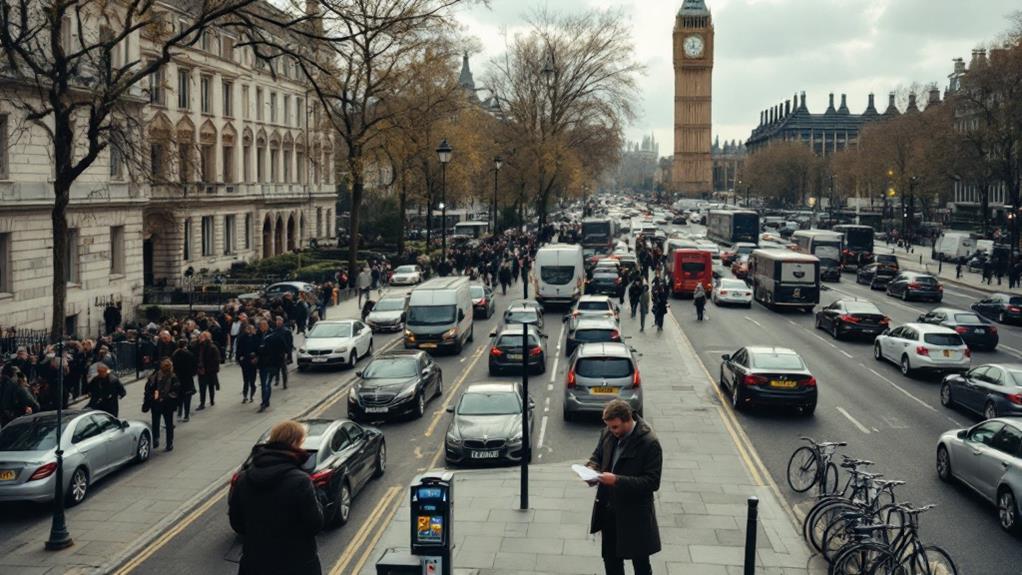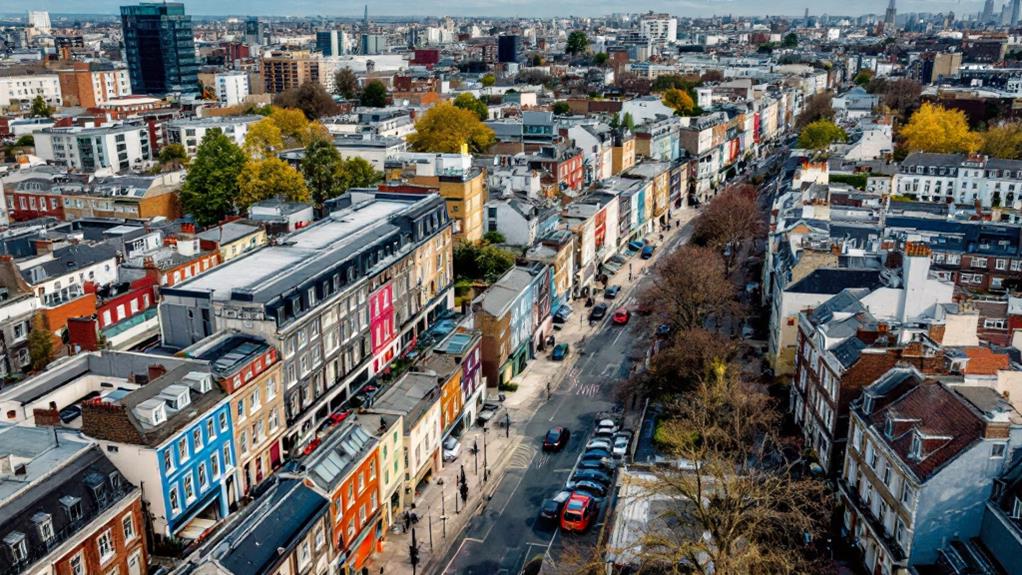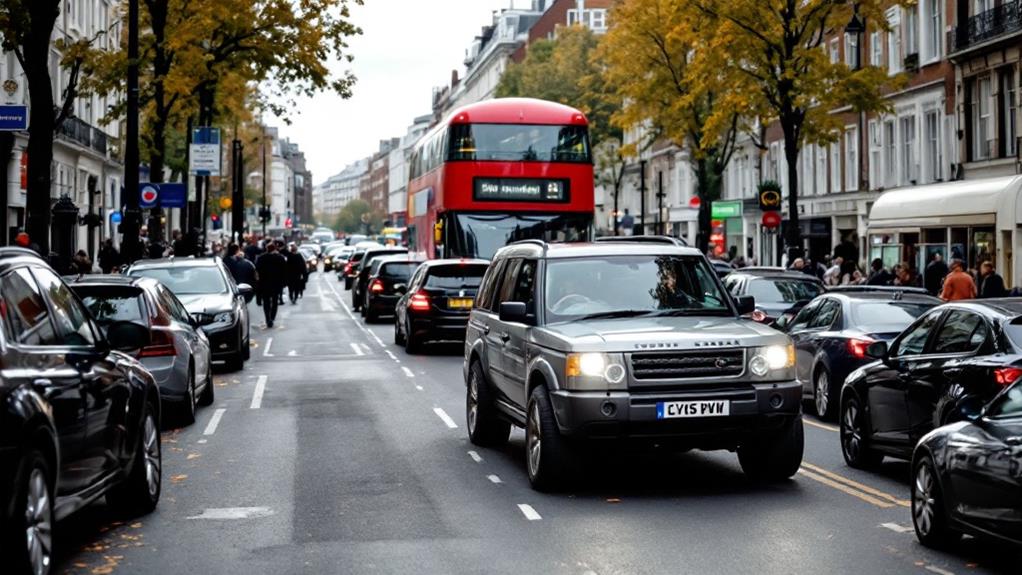London Parking Restrictions: What Every Driver Needs to Know
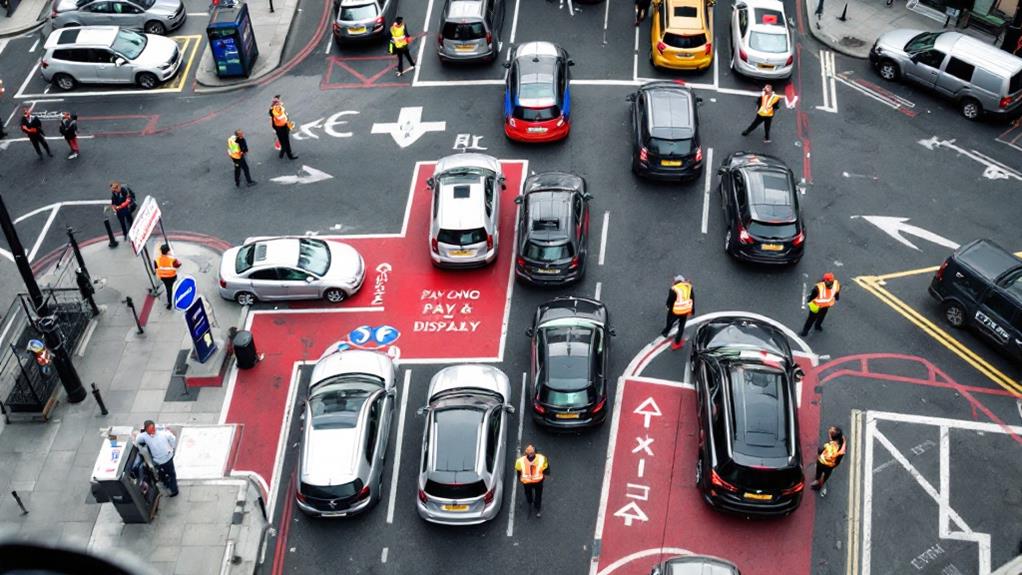
When parking in London, you'll encounter a maze of regulations. Yellow and red lines indicate various waiting restrictions, while car parks offer a more straightforward option. If you're a Blue Badge holder, you have special privileges, but be aware of exceptions. Penalty Charge Notices can be costly, so always check local rules and pay promptly if fined. Various payment methods are available for parking, including cashless options. Commercial vehicles face overnight restrictions, and pavement parking is generally prohibited. Understanding these key points will help you investigate London's parking terrain, but there's much more to delve into about the city's intricate parking system.
Yellow and Red Line Restrictions
Traversing London's parking constraints can be challenging, but comprehending yellow and red line markings is essential. Single yellow lines indicate waiting restrictions based on nearby parking signs. You can't park during specified times, but brief stops for passenger pick-up or drop-off may be allowed. Double yellow lines are more stringent, prohibiting waiting or parking at any time unless signs state otherwise.
Red Routes in London have even stricter parking restrictions. A single red line means no stopping during posted times, while double red lines prohibit stopping at any time, except in stationary traffic. These road markings are designed to keep traffic flowing smoothly.
There are some exceptions to these rules. If you're loading or unloading heavy goods, you may briefly stop on double yellow lines. Blue Badge holders can usually park on double yellows for up to three hours. However, violating these restrictions can result in a Penalty Charge Notice.
Fines for parking on double yellow lines typically amount to £70. You can reduce this by 50% if you pay within 14 days. Always check for parking signs and adhere to road markings to avoid penalties and keep London's traffic moving efficiently.
Car Parks in Central London
Numerous car parks dot central London, offering convenient alternatives to on-street parking. Two major operators, NCP and Q-Park, manage a significant portion of these facilities. NCP operates around 100 car parks throughout London, including at airports, while Q-Park runs 16 car parks in prime central locations such as Oxford Street, Soho, and Knightsbridge.
When planning your trip, you can use the Parkopedia website to find suitable parking options at your destination. This can help you avoid the stress of searching for parking spaces or dealing with complex on-street parking restrictions. Remember that most parking restrictions in London apply from 8:30 am to 6:30 pm, Monday to Saturday.
While car parks offer a more straightforward option than maneuvering permit parking, parking zones, or blue badge parking areas, they often come with higher parking charges. However, they eliminate the risk of accidentally parking on pavements or in loading bays, which could result in fines or even vehicle clamping in some boroughs. Always check parking signs carefully and consider using pay and display or phone parking systems when opting for on-street parking.
Disabled Parking Regulations
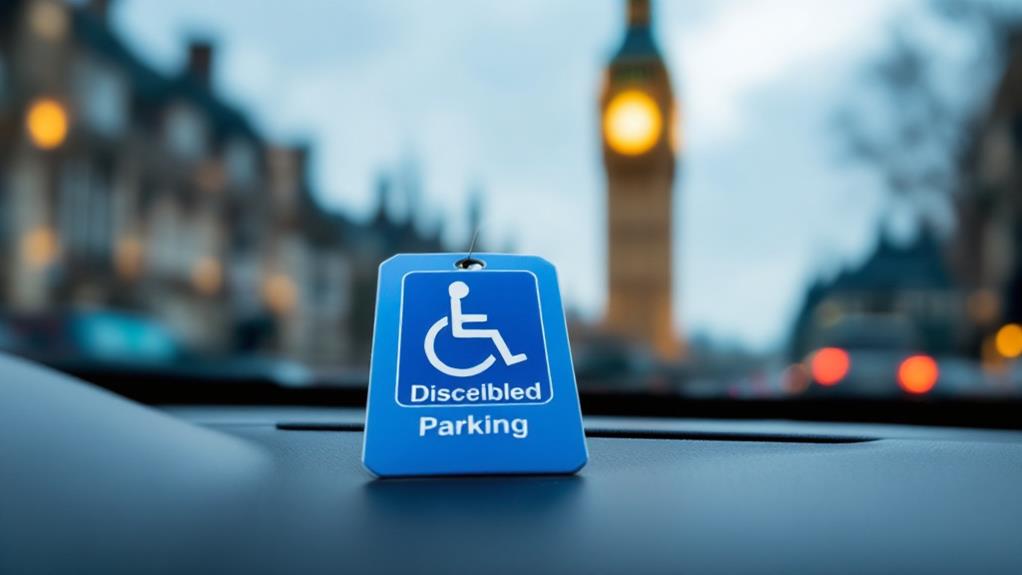
Traversing disabled parking regulations in London can be complex, particularly for Blue Badge holders. The Blue Badge scheme offers parking benefits for eligible disabled drivers, but it is of utmost importance to understand that these concessions don't apply uniformly across all boroughs.
As a Blue Badge holder, you can register for a 100% discount on the London Congestion Charge. However, you'll need to be cautious when using commercial car parks, as designated disabled bays may still be charged at standard rates. Always check the specific entitlements for each location.
In certain areas like Westminster, Kensington/Chelsea, City of London, and parts of Camden, Blue Badge concessions don't apply. Here, you must comply with regular parking restrictions. It is critical to be aware of these exceptions to avoid unexpected fines.
Proper display and use of your Blue Badge is paramount. Misuse can result in a Penalty Charge Notice (PCN) and potentially lead to your badge being revoked. This applies to all Blue Badge holders, including those with visual impairments and people with other disabilities.
Penalty Charge Notices Explained
While understanding disabled parking regulations is important, it's equally essential to know about Penalty Charge Notices (PCNs) in London. These fixed penalty Charge Notices are issued by local authorities for parking and traffic offenses. If you receive a PCN, you'll typically face fines ranging from £80 to £130.
You must not park partially or in a way that might obstruct and seriously inconvenience other road users, as this can result in a parking charge notice. Enforcement Officers are authorized to issue these notices when they observe violations. It's pivotal to understand that you have options when dealing with a PCN. You can benefit from a 50% discount if the fine is paid within 14 days of issue. Payment methods include online, phone, post, or in-person options.
Be aware that failing to pay your PCN can lead to serious consequences. The issuing borough may initiate debt recovery action against you. In some cases, especially for unpaid PCNs or severe parking contraventions, clamping and vehicle removal may be employed. If you believe the PCN was issued unfairly, there's an appeals process available, but you must adhere to specific time limits.
Payment Methods for Parking
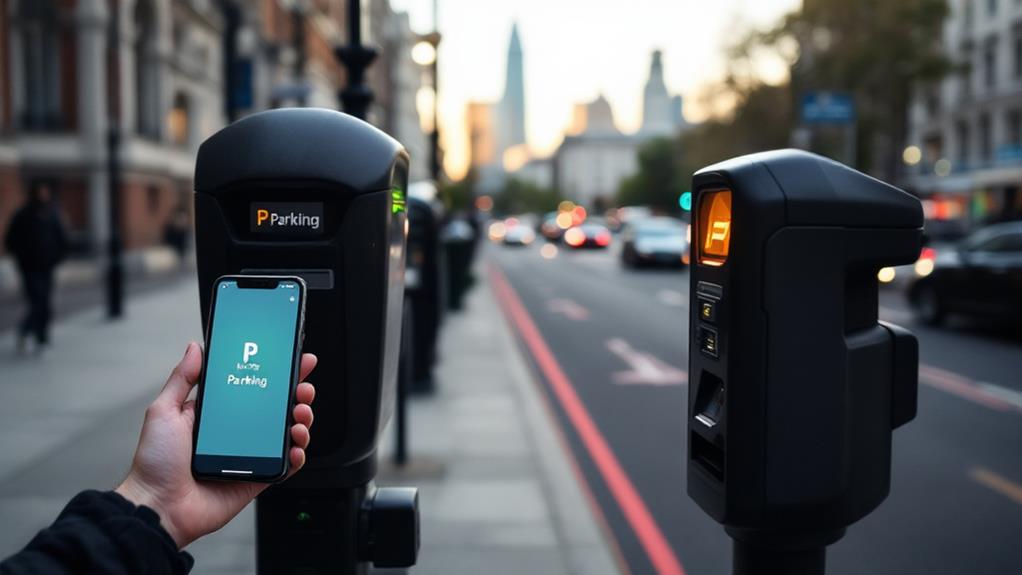
When it comes to paying for parking in London, you'll find a variety of convenient options at your disposal. Pay-and-display machines are widely available, accepting cash, card, and contactless payments at many on-street and off-street locations. If you prefer cashless parking, you can use mobile apps or parking provider accounts to pay remotely, saving you time and hassle.
Some parking facilities offer pre-booking and online payment options, allowing you to guarantee a space and streamline the process. However, it is crucial to check the specific payment methods accepted by different boroughs and car parks before arriving, as they may vary.
If you're a Blue Badge holder, you can often park for free or at reduced rates in designated disabled bays. Keep in mind that some commercial car parks may still require you to pay standard tariffs, so always verify the rules beforehand.
With these diverse payment methods available, you can choose the most convenient option for your needs. Whether you prefer traditional pay-and-display machines or the flexibility of mobile apps, London's parking system aims to accommodate various preferences and make your parking experience as smooth as possible.
Overnight and Commercial Vehicle Parking
Maneuvering through London's parking regulations for commercial vehicles can be tricky, especially when it comes to overnight parking. If you own or operate a commercial vehicle in London, you need to be aware of the strict parking restrictions in place across the city's boroughs.
Commercial vehicles are prohibited from parking on residential streets overnight, with restrictions typically enforced from midnight to 8 AM, seven days a week. This parking ban applies to all London boroughs, so you'll need to find alternative parking solutions during these hours. If you violate these regulations, you risk receiving parking tickets or a Penalty Charge Notice, which can result in hefty fines.
To avoid penalties, make sure you're familiar with the specific parking exemptions that may apply to your situation. Some areas might have designated parking spaces for commercial vehicles or offer permits for overnight parking. However, it's essential to check the local regulations in your area, as enforcement of these restrictions is taken seriously across London.
Pavement Parking Rules
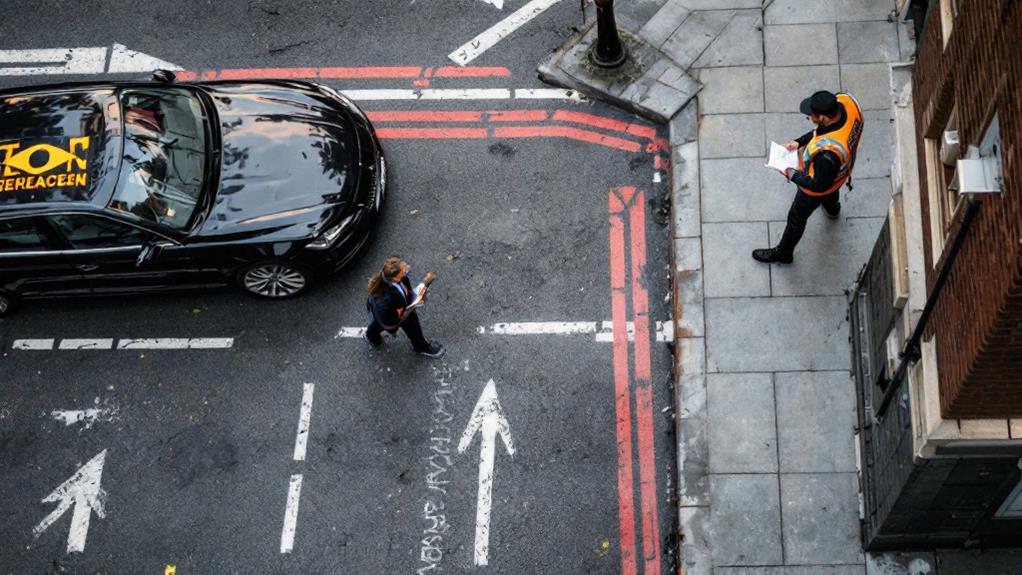
Pavement parking is another essential aspect of London's parking regulations that drivers must understand. In general, parking on the pavement is prohibited throughout the city, unless signs explicitly indicate otherwise. This rule is in place to protect pedestrians, especially those with mobility issues, from obstruction and inconvenience.
The Highway Code's Rule 244 specifically addresses this issue, emphasizing the ban on parking partially or wholly on the pavement in London. If you're caught violating these restrictions, you may face fines or other penalties. Enforcement officers can issue Fixed Penalty Notices to vehicle owners who disregard these rules.
As a driver in London, it's vital to be aware of these pavement parking regulations to avoid potential fines and guarantee the safety and convenience of pedestrians. Always look for designated parking areas or clear signage indicating where parking is permitted. Remember that even if you think you're leaving enough space on the pavement, it may still cause difficulties for those with mobility aids, pushchairs, or visual impairments. By adhering to these rules, you'll contribute to a more accessible and pedestrian-friendly London.
Controlled and Restricted Parking Zones
London's parking environment includes several specialized areas that drivers must traverse carefully. Controlled Parking Zones (CPZs) are one such area, where parking restrictions apply during specific hours. You'll need a permit to park in these zones, and you should look out for signs indicating the operational times. Even without visible yellow lines, restrictions may still be in effect.
Restricted Parking Zones (RPZs) are similar to CPZs but don't rely on yellow lines to indicate restrictions. Instead, you'll see entry signs detailing the rules. In both CPZs and RPZs, loading and waiting restrictions may apply, so be vigilant about signage.
Permit Parking Areas (PPAs) require a specific permit during operational hours, even without marked bays. If you don't have the correct badge, you risk a fine. Pedestrian Zones prohibit vehicle entry during certain times and may have additional parking restrictions.
Remember that seasonal variations can affect parking rules, especially in tourist hotspots or busy shopping areas. Always check for signs indicating current restrictions, as they may differ from what you're used to. Single yellow lines, red lines, and other markings can provide additional guidance on where and when you can park your vehicle.
Appeals Process for Parking Fines
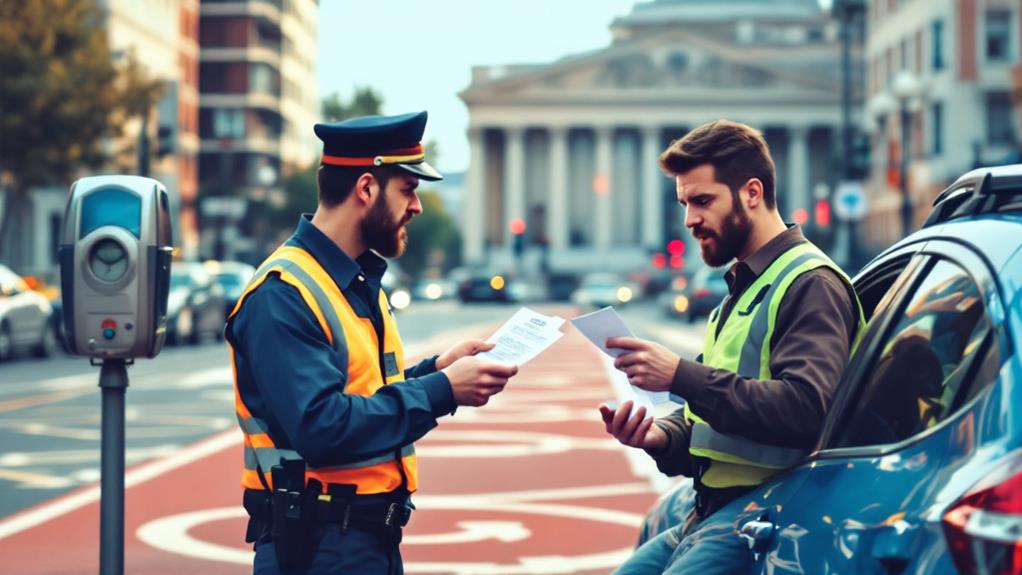
If you've received a Penalty Charge Notice (PCN) for a parking offense in London, you're not out of options. You have the right to appeal within 28 days of the notice date. The appeals process is designed to give you a chance to contest the fine if you believe it was issued unfairly.
To appeal, you can submit your case online, by post, or in person. Whichever method you choose, it's essential to include evidence supporting your grounds for appeal. Common reasons for contesting a PCN include incorrect vehicle details, medical emergencies, or proof of a valid permit or exemption.
When preparing your appeal, be clear and concise in explaining why you believe the PCN should be cancelled. If your initial appeal is rejected, don't lose hope. You can make a further appeal to an independent adjudicator.
